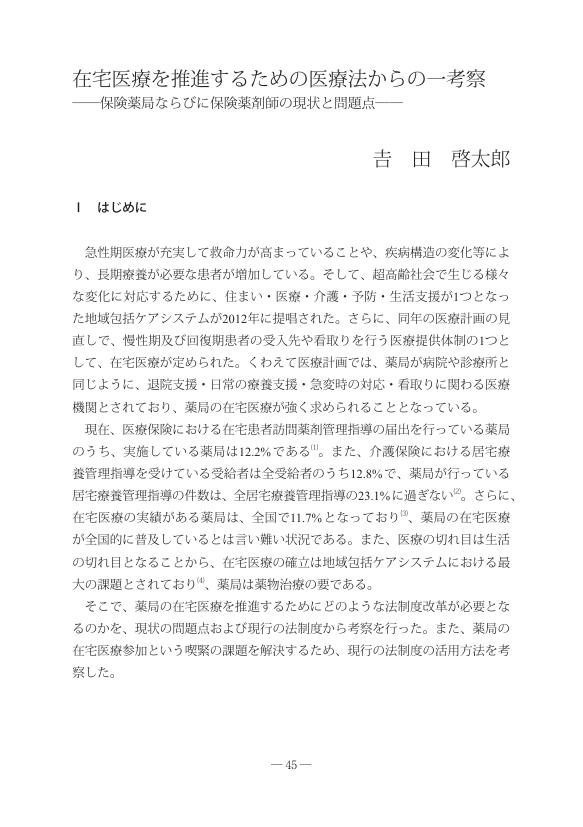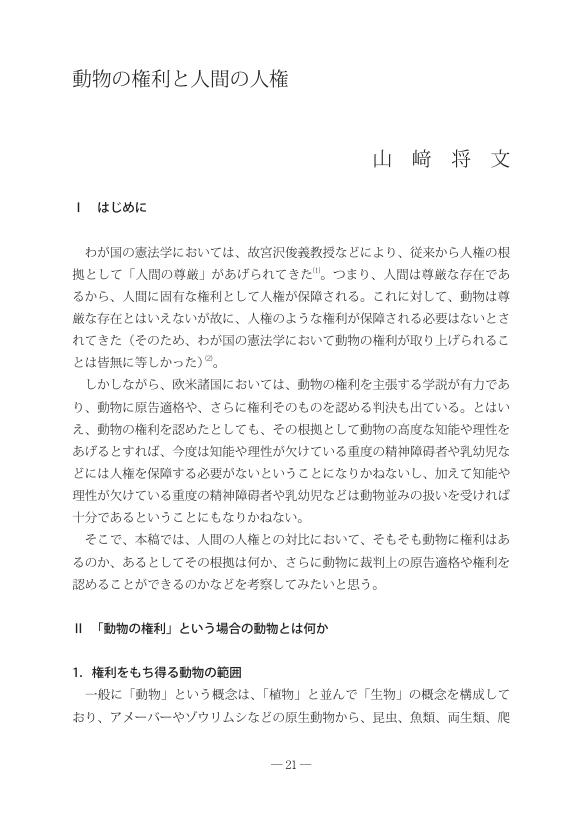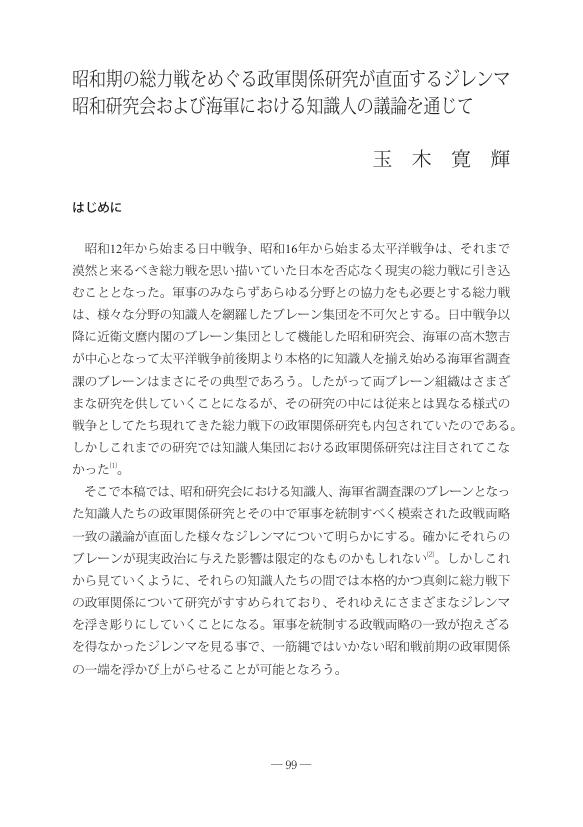42 0 0 0 OA 性同一性障害者の性別変更審判の要件の再検討
- 著者
- 野間 紗也奈
- 出版者
- 日本法政学会
- 雑誌
- 法政論叢 (ISSN:03865266)
- 巻号頁・発行日
- vol.56, no.1, pp.49, 2020 (Released:2020-06-22)
38 0 0 0 OA 憲法改正手続の国際比較
- 著者
- 北村 貴
- 出版者
- 日本法政学会
- 雑誌
- 法政論叢 (ISSN:03865266)
- 巻号頁・発行日
- vol.51, no.1, pp.161, 2014 (Released:2017-11-01)
19 0 0 0 OA 在宅医療を推進するための医療法からの一考察
- 出版者
- 日本法政学会
- 雑誌
- 法政論叢 (ISSN:03865266)
- 巻号頁・発行日
- vol.52, no.2, pp.45, 2016 (Released:2017-11-01)
15 0 0 0 OA スウェーデンの選挙制度について
- 著者
- 田中 久雄
- 出版者
- 日本法政学会
- 雑誌
- 法政論叢 (ISSN:03865266)
- 巻号頁・発行日
- vol.56, no.1, pp.157, 2020 (Released:2020-06-22)
15 0 0 0 OA 保守合同後の政党政治と外交政策論争
- 著者
- 吉田 龍太郎
- 出版者
- 日本法政学会
- 雑誌
- 法政論叢 (ISSN:03865266)
- 巻号頁・発行日
- vol.51, no.1, pp.17, 2014 (Released:2017-11-01)
14 0 0 0 OA オーストリア共和国における憲法とその法源 : 連邦憲法の法源とその歴史的一面
- 著者
- 槇 裕輔
- 出版者
- 日本法政学会
- 雑誌
- 法政論叢 (ISSN:03865266)
- 巻号頁・発行日
- vol.43, no.2, pp.145-155, 2007-05-15 (Released:2017-11-01)
Im Mittelpunkt des osterreichischen Bundesverfassungsrechts steht das Bundes-Verfassungsgesetz, zu den das Bundes-Verfassungsgesetz, "Gesetz vom 1. Oktober 1920, womit die Republik Osterreich als Bundesstaats einrichtet wird" (BGB1 1920/1), in den Jahren 1925 und 1929 durch zwei umfassungreiche Bundesverfassungsnovellen geandert wurde und dessen Titel das "Bundes-Verfassungsgesetz in der Fassung von 1929" ist. Eine grosse und formelle Eigenart des osterreichschen Bundesverfassungsrechts ist, daB das hat viele Rechtsquellen, die die Bundes-verfassung(B-VG) als eine Rechtsquelle des Bunderverfassungsrecht, das Bundesverfassungsgesetz(BVG), einzelne Bstimmungen eines Gesetzes als Verfassungsbestimmungen, Staatsvertrage in Verfasssunsgrang und einzelne Verfassungsbsetimmungen in Staatsvertragen sind. Zur das Verfassungsgesetz gehort das Staatsgrundgesetz vom 21. Dezember 1867, uber die allgemeinen Rechte der Staatsburger fur die im Reichsrate vertretenen Konigreiche und Lander welches in Kraft gesetzt worden ist. Und dieses Staatsgrundgesetz gilt heute noch als ein Bundesverfassungsgesetz. In dieser Abhandlung wurde ich uber die Rechtsquellen als die Eingenart der osterreichischen Bundesverfassung und eine Seite der Bundesverfassungsgeschichte betrachten.
13 0 0 0 OA 日本海軍の軍政機関と軍令機関 ─「協同輔翼」をめぐる慣行─
- 著者
- 浅井 隆宏
- 出版者
- 日本法政学会
- 雑誌
- 法政論叢 (ISSN:03865266)
- 巻号頁・発行日
- vol.54, no.1, pp.35, 2018 (Released:2018-07-14)
13 0 0 0 カナダにおける表現の自由の保障と憎悪表現の禁止
- 著者
- 小谷 順子
- 出版者
- 日本法政学会
- 雑誌
- 法政論叢 (ISSN:03865266)
- 巻号頁・発行日
- vol.42, no.1, pp.145-160, 2005
The Canadian Supreme Court has upheld hate speech regulation in several cases, whereas the U. S. Supreme Court has struck down such regulation, invalidating the idea of such regulation. This article focuses on Canadian Supreme Court cases involving hate speech regulation and analyzes the reasons behind the contrasting attitudes of the two neighboring countries with similar backgrounds. Chapter I briefly outlines the constitutional problems surrounding the regulation of hate speech in the democratic world. Chapter II describes general characteristics of Freedom of Speech in Canada, which is guaranteed by the Canadian Charter of Rights and Freedoms. Chapter III analyzes five cases ruled in the Canadian Supreme Court, four of which upheld hate speech regulation. Chapter IV makes comparative analysis of Canadian and U. S. cases by referring to differences in the texts of the Constitutions, case laws, public acceptance, and so forth.
13 0 0 0 OA 昭和戦前期日本人のヒトラー像
- 著者
- 岩村 正史
- 出版者
- 日本法政学会
- 雑誌
- 法政論叢 (ISSN:03865266)
- 巻号頁・発行日
- vol.36, no.2, pp.209-228, 2000-05-15
Introduction I Response to Hitler's administration II Admiration for Hitler in the Japanese-Chinese War III World War II and Shaking Image of Hitler Conclusion
- 著者
- 高市 早苗
- 出版者
- 日本法政学会
- 雑誌
- 法政論叢 (ISSN:03865266)
- 巻号頁・発行日
- vol.42, no.2, pp.201-224, 2006-05-15
10 0 0 0 OA 動物の権利と人間の人権
- 著者
- 山﨑 将文
- 出版者
- 日本法政学会
- 雑誌
- 法政論叢 (ISSN:03865266)
- 巻号頁・発行日
- vol.54, no.2, pp.21, 2018 (Released:2018-09-27)
10 0 0 0 OA マインドレイプ被害者への社会的支援制度 : 自己啓発セミナー被害から
- 著者
- 幸重 忠孝
- 出版者
- 日本法政学会
- 雑誌
- 法政論叢 (ISSN:03865266)
- 巻号頁・発行日
- vol.37, no.2, pp.1-14, 2001-05-15 (Released:2017-11-01)
The victim who caught psychosomatic damage by participating in self improvement seminar which was educational cult exists abundantly. This psychosomatic damage is the wound caught by mind rape. It can't complain about it, and it is everywhere as for the victims the damage of mind rape. It is rare that the problem of self improvement seminar is brought even into the judgment specially. Two factors exist greatly as a reason. To begin with, cult group are to control a member by using mind control. Secoundly, self improvement seminar are to use that it is hard to judge by law for mind control. This report analyzes about mind control and mind rape by cult group. Then, a past precedent is taken up about the damage of self improvement seminar. It is examined how it was interpreted about mind rape in the judgment from the precedent. The need of the social support system to the victim of mind rape is suggested at the end.
- 著者
- 玉木 寛輝
- 出版者
- 日本法政学会
- 雑誌
- 法政論叢 (ISSN:03865266)
- 巻号頁・発行日
- vol.58, no.2, pp.99, 2023 (Released:2023-04-25)
- 著者
- 小谷 順子
- 出版者
- 日本法政学会
- 雑誌
- 法政論叢 (ISSN:03865266)
- 巻号頁・発行日
- vol.40, no.2, pp.149-167, 2004
In 1992, the U.S. Supreme Court struck down an ordinance banning "fighting words", including cross-burning and the display of swastika, that insulted others or provoked violence "on the basis of race, color, creed, religion or gender." In R.A.V. v. St. Paul, the Court stated that the ordinance impermissibly discriminated against unpopular topics within the category of proscribable speech and thus violated the First Amendment of the U.S. Constitution. Although the Court acknowledged that combating racism was in the city's interest, it concluded that the city could not advance that interest by singling out unfavorable speech for punishment and declared the ordinance unconstitutional. In 1993, however, the Court upheld a Wisconsin penalty-enhancement law in Wisconsin v. Mitchell, declaring that the statute only penalized the criminal action, not the idea or speech. After R.A.V. and Mitchell, hate speech regulations of any form were considered impermissible while penalty enhancement laws and their variations were considered permissible, and the lower courts handled the cases before them accordingly. Cross-burning statutes, however, caused confusion, with five statutes being declared unconstitutional and two constitutional. In 2003 the Supreme Court upheld a Virginia statute banning cross-burning with the intent to threaten others in Virginia v. Black. The Court stated that the statute simply singled out the most terrifying type of threat of all types of threat, and therefore it did not discriminate against certain topics or viewpoints as the ordinance in R.A. V. did. This article analyzes these three federal high court cases along with seven state cases, and then compares R.A.V. and Black, and concludes that the two codes both banned controversial topic within proscribable categories and that the Court's handling of the two cases was inconsistent and inappropriate.
9 0 0 0 OA 特別講演「利他的人間-シルクロード仏教芸術のささやき-」
- 著者
- 入澤 崇
- 出版者
- 日本法政学会
- 雑誌
- 法政論叢 (ISSN:03865266)
- 巻号頁・発行日
- vol.54, no.2, pp.225, 2018 (Released:2018-09-27)
8 0 0 0 合衆国憲法修正一条の表現の自由とヘイトスピーチ
- 著者
- 小谷 順子
- 出版者
- 日本法政学会
- 雑誌
- 法政論叢 (ISSN:03865266)
- 巻号頁・発行日
- vol.36, no.1, pp.160-169, 1999
When racial/sexual harassment became rampant in the U.S. in 1980s, many colleges and universities along with local governments adopted regulations which proscribed hate speech and other fotms of hatred. In 1992, however, the Supreme Court struck down an ordinance banning "fighting words" that insulted or provoked violence "on the basis of race, color, creed, religion or gender." In R.A.V.v.City of St. Paul, the Court stated that the ordinance impermissibly discriminated against unpopular topics. Critics of R.A.V. showed deep concern for the logic of the Court and others provided their reasoning for upholding strictly framed regulations. In this Article, I intend to present outline of the debate on hate speech regulations in the United States. In Chapter II, I overview the anti-regulation argument by presenting R.A.V. and then point out the flaw in its logic. In Chapter III, I turn to the pro-regulation argument and discuss how the proponents of the regulations solves the problem of content/viewpoint discrimination. I then present the harm caused by hate speech, and finally analyze hate speech regulations under the values of the Freedom of Speech.
8 0 0 0 海軍の南進と南洋興発 : 一九一四年~一九三〇年を中心に
- 著者
- 佐伯 康子
- 出版者
- 日本法政学会
- 雑誌
- 法政論叢 (ISSN:03865266)
- 巻号頁・発行日
- vol.36, no.2, pp.229-237, 2000
1.Strategic values of the South Sea Islands for the Japanese Navy. 1)The 1st World War and dispatch cruisers by the reguest of Sir.Winston Churchill, the Minister of the Royal Navy. 2)Occupation of the South Sea Islands 3)Churchill's reguest of destroyers and a promise between Japan and the U.K. 4)The Paris Peace Conference 5)Reguest to Nanyokohatsu 2.Strategic values of the South Sea Islands for Nanyokohatsu. 1)Establishment of Nanyokohatsu. 2)The business development by Haruji Matsue.
7 0 0 0 OA 明治新政府の国境画定交渉
- 著者
- 倉山 満
- 出版者
- 日本法政学会
- 雑誌
- 法政論叢 (ISSN:03865266)
- 巻号頁・発行日
- vol.50, no.1, pp.122, 2013 (Released:2017-11-01)
7 0 0 0 OA 辜振甫と「台湾独立計画」事件
- 著者
- 渡辺 耕治
- 出版者
- 日本法政学会
- 雑誌
- 法政論叢 (ISSN:03865266)
- 巻号頁・発行日
- vol.52, no.1, pp.137-154, 2016-02-25 (Released:2017-11-01)
On 15th August 1945, Japanese government accepted the "Potsdam Declaration", and the Second World War ended. Based on the "Potsdam Declaration" and General Order No.1 by Office of the Supreme Commander for the Allied Powers, Republic of China started to get the governance of Taiwan. But from 15th August to 25th October, the day Japanese Governor General Rikichi Ando subscribed the Declaration of the surrender of Taiwan to the Allied Powers, there was a political vacuum period in Taiwan. On 16th August 1945, Koo Chen-fu took part in a meeting with a few Japanese Army Officers in Taiwan to have a plan to keep the social and political order in Formosa. That meeting has been considered as a conspiracy of "Taiwan Independence" or "Taiwan Autonomy Planning", after ROC got the governing power there. In fact, according to the instruction of Japanese Governor General, the attendance of the meeting did nothing about that. Even so, the ROC governing entity in Taiwan arrested the members in February 1946 as they involved in the "Taiwan Independent Plot", and Koo Chen-fu was sentenced to be imprisoned in July 1947. This article makes clear that the background of unfair judgment on Koo Chen-fu and real purpose of the Taiwan Garrison Command to capture those pro-Japanese Intellectual Taiwanese Group.
7 0 0 0 OA スウェーデン憲法における象徴君主制
- 著者
- 下條 芳明
- 出版者
- 日本法政学会
- 雑誌
- 法政論叢 (ISSN:03865266)
- 巻号頁・発行日
- vol.54, no.2, pp.43, 2018 (Released:2018-09-27)












